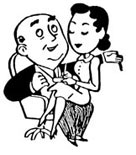
Student-Professor Sex
THE STENCH OF THE ZOO
The cover says “Consenting Adults? Sex and the Academy,” and the entire September-October 1998 issue of the magazine Academe, which is “The Bulletin of the American Association of University Professors,” is devoted to sex. About a third of the magazine is devoted to defending homosexuality and extolling it as the coolest thing on campus. But that comes at the end. The issue opens with, and spends most of its pages pondering, a different and fairly simple question: Is it okay for teachers to have sex with students? Academe is written for teachers, but even a non-teacher — say, a parent with a college-bound child, or an alumnus being asked for a donation, or a legislator considering more funding for higher education — may be interested in how the nation’s pre-eminent academic professional journal answers that question.
The Editor starts off the discussion. “There’s no centerfold in this issue of Academe,” she says perkily, “nor is there a consensus. People’s opinions vary as widely as their practices. Within the academy, intelligent, enlightened, and well-meaning individuals can be found on all sides of the topic.”
Already the reader must pause: Is this writing and thinking of university caliber? The joke about “no centerfold” falls flat and is strangely flippant: What exactly is there to joke about? The attempt to suggest complexity — the wide variations and the many, many sides — is labored and hence suspect. (How many “sides” can there be? The non-academic reader figures that in the end there are only two, Yes and No.) Then comes the string of fawning adjectives, which displays several vices of prose composition that should have been cured back in freshman English: gratuitous compliment, trivial truth, and innocuous proposition. Let us grant that there may be persons who can be called “enlightened and well-meaning” scattered on various “sides”; even if true, this is trivial. The substantive question is: On which side are the unenlightened and ill-meaning individuals gathered? Trying to answer that question would make for an editorial worth reading. But the Editor doesn’t even hint that such creatures may exist among our nation’s academics.
Several articles then proceed to treat the question of sex between teachers and students, and reading them I was reminded of Omar Khayyám’s old verse about his experience among the scholars:
You May Also Enjoy
The mental-health professions in recent years have changed their opinion of religion and now regard faith as a reliable predictor of well-being.
In the sociological imagination, it is man who creates God. Once he frees himself from God, anything is possible, or at least appears to be.
A meritocracy fits America’s sense of itself as free from the class-based social structures that defined the European countries from which our predecessors fled.

